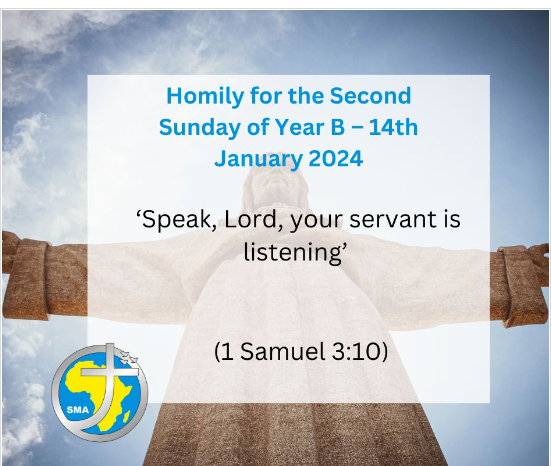Readings:1 Samuel 3:3-10,19; 1 Corinthians 6:13-15,17-20; John 1:35-42
Theme: ‘Speak, Lord, your servant is listening ’ (1 Samuel 3:10)
Today’s readings are all about listening and responding to the call of the Lord. The first reading describes the call of Samuel, the son of Hannah and Elkanah in their old age. During the night, young Samuel hears a voice while serving in the sanctuary of the Lord. Thinking it is the high priest, Eli, who is calling him, he goes to him to find out what he wants. We are told, at this time, Samuel had ‘no knowledge of the Lord and the word of the Lord had not been revealed to him’ (1 Sam 3:7). It is Eli who eventually recognises that the Lord is calling Samuel and who tells him to respond with the memorable words ‘Speak, Lord, your servant is listening’ (I Sam 3:9).
These words express the attitude of openness and attentive listening required to discern the call of the Lord in our lives. It is the attitude we must cultivate when we pray. Sometimes we turn Samuel’s words on their head and say or think: ‘Listen, Lord, your servant is speaking’, so anxious are we that the Lord will answer our requests. Of course, the Lord listens to us, but we must first listen and pay attention to what he is saying to us. And he speaks to us not only in Scripture, but also in the book of nature, through others, and in our everyday experiences. He is always speaking to us in the depths of our hearts and calling us to be his co-workers in creating a world that reflects his love. Rather than an insistent voice in the stillness of the night, as was the case with Samuel, his call may be more akin to a tug at our heartstrings, something we feel at quiet and reflective moments in our life. In whatever way it comes, it is important that we listen attentively to what the Lord is saying to us, and follow the example of Samuel, whom we are told ‘grew up and the Lord was with him and let no word of his fall to the ground’ (1 Sam 3:9).
Our gospel reading today is John’s account of the call of the first disciples of Jesus, Andrew, his brother, Simon Peter, and John. John and Andrew were already disciples of John the Baptist, and it was the Baptist who identified Jesus for them, saying ‘Look, there is the Lamb of God’. The Baptist’s use of the messianic title, ‘Lamb of God’, shows that he recognises Jesus as the Messiah and is prepared to let his own disciples follow Jesus. It also explains why Andrew and John immediately leave the Baptist and follow Jesus. Jesus then turns around to them and asks them what they want, or what they are looking for – a searching question, indeed? It is a question addressed also to us, inviting us to look into our own hears, and try to discover, in the words of the Spice Girls, ‘what you want, what you really, really want.’
Almost certainly John and Andrew were hoping to find the Messiah, the one whom they hoped would fulfil the promises made to the prophets of old and liberate the People of Israel from Roman oppression. We can presume that, in common with most of Jesus’ contemporaries, they did not have any clear understanding of how the Messiah would fulfil this promise. In any case, they were prepared to allow Jesus to reveal himself to them. When they ask Jesus where he was living, Jesus doesn’t give them instructions on how to get to his house. He invites them, rather, to ‘come and see’ for themselves. Jesus is saying to Andrew and John and to us as well: ‘If you want to know me, you have to live with me’. He wants to have a personal relationship, a friendship, with those who wish to follow him. Andrew and John stay with Jesus ‘the rest of that day’. Andrew, convinced that they had found the Messiah, tells his younger brother, Simon Peter, and brings him to Jesus who looks at him intently and gives him a new name, Cephas, which means Rock.
I will conclude by highlighting four important lessons for us in today’s readings. First, like Samuel, we are reminded of the importance of listening and paying attention to the voice of the Lord and treasuring his word. Second, like Eli and Andrew, we are enjoined to share the good news with others and lead them to the Lord, but then let the Lord take over. We must not stand in the way. Third, we are challenged to clarify what we are looking for in life and what we are hoping for from the Lord. Finally, if we want to be true disciples of Jesus, we must be prepared to spend time with him and develop a personal relationship with him. I end with a short reflection from the pen of the popular Spiritual writer, Carlo Caretto, entitled God’s Call:
God’s call is mysterious; it comes in the darkness of faith.
It is so fine, so subtle,
that it is only with the deepest silence within us that we can hear it.
And yet nothing is surer or stronger;
nothing is so decisive and overpowering as that call.
This call is uninterrupted; God is always calling us.
Michael McCabe SMA
To listen to an alternative Homily for this Sunday, from Fr Tom Casey of the SMA Media Centre, Ndola, Zambia please click on the play button below.

